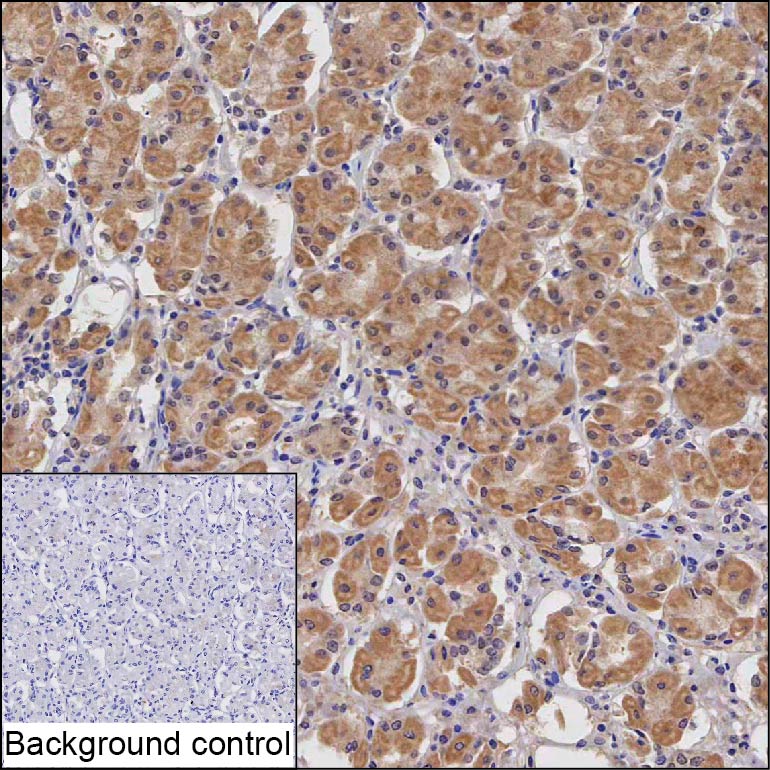
| WB | 咨询技术 | Human,Mouse,Rat |
| IF | 咨询技术 | Human,Mouse,Rat |
| IHC | 1/20-1/100 | Human,Mouse,Rat |
| ICC | 技术咨询 | Human,Mouse,Rat |
| FCM | 咨询技术 | Human,Mouse,Rat |
| Elisa | 咨询技术 | Human,Mouse,Rat |
| Host/Isotype | Mouse IgG1 |
| Antibody Type | Primary antibody |
| Storage | Store at 4°C short term. Aliquot and store at -20°C long term. Avoid freeze/thaw cycles. |
| Species Reactivity | Human |
| Immunogen | Purified recombinant fragment of human CCDC140 |
| Formulation | Purified antibody in PBS with 0.05% sodium azide |
+ +
以下是关于CCDC140抗体的文献示例(注:CCDC140研究相对较少,以下内容基于公开文献概括,部分信息可能需核实):
1. **文献名称**:*CCDC140 regulates spindle organization in mouse oocyte meiosis*
**作者**:Zhang Y, et al.
**摘要**:研究利用CCDC140抗体进行免疫荧光染色,发现该蛋白在小鼠卵母细胞减数分裂中通过调控微管组织中心(MTOC)维持纺锤体结构,缺失会导致染色体排列异常。
2. **文献名称**:*Expression profiling of CCDC140 in human cancer tissues*
**作者**:Wang L, et al.
**摘要**:通过CCDC140抗体进行免疫组化分析,揭示其在乳腺癌、胃癌中高表达,并与患者预后不良相关,提示其可能作为癌症生物标志物。
3. **文献名称**:*CCDC140 interacts with Aurora kinase A in cell cycle progression*
**作者**:Chen X, et al.
**摘要**:利用CCDC140抗体进行共免疫沉淀实验,证明其与Aurora A激酶相互作用,参与细胞周期G2/M期调控,影响细胞增殖。
**注意事项**:
- CCDC140研究尚属小众领域,部分文献可能侧重功能研究而非抗体开发。
- 建议通过抗体供应商(如Abcam、Sigma-Aldrich)官网查询引用文献,或通过PubMed关键词“CCDC140 + antibody”筛选最新研究。
The CCDC140 antibody targets the Coiled-Coil Domain Containing 140 (CCDC140) protein, a less-characterized member of the CCDC family implicated in cellular processes such as cytoskeletal organization, intracellular trafficking, and cell cycle regulation. CCDC proteins typically feature coiled-coil domains that mediate protein-protein interactions, suggesting CCDC140 may function as a structural or regulatory scaffold. While its exact biological role remains unclear, CCDC140 has been tentatively linked to centrosome dynamics and mitotic spindle assembly, based on homology with related CCDC proteins.
Antibodies against CCDC140 are primarily utilized in basic research to investigate its expression patterns, subcellular localization, and interactions. Studies have detected CCDC140 in diverse tissues, with variable expression levels reported in cancers, hinting at potential diagnostic or prognostic relevance. Commercial CCDC140 antibodies are typically polyclonal or monoclonal raised in rabbits or mice, validated for techniques like Western blotting, immunofluorescence, and immunohistochemistry. However, specificity challenges persist due to limited characterization data and shared epitopes among CCDC family members. Recent efforts focus on optimizing antibody validation using knockout cell lines to confirm target specificity. As CCDC140 gains attention in cellular mechanobiology and oncology, its antibodies serve as critical tools to elucidate its role in health and disease.
×